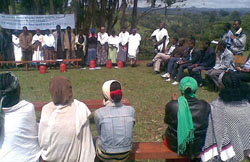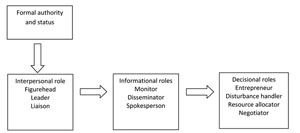What do managers do?
So, what do health managers actually do? Managers play various roles in their day-to-day activities which are generally categorised as interpersonal roles, informational roles and decisional roles. As a health professional, who is also a frontline manager, you will have a role to play at community level. The different roles are briefly described as follows.
Interpersonal roles
Working together with other people in your team is sometimes the most rewarding part of the job, but it does require skill. Interpersonal roles require you to direct, support and supervise your team, and work together with people from other agencies. This role is particularly critical for health professionals, who must often compete with other managers (in agriculture) for important resources, yet also maintain successful working relationships with them. Interpersonal roles are categorised as the leader role, figurehead role and liaison role.
The leader role involves all the leadership and motivational activities that are essential for the effective management of people. The people that will expect you to fulfill a role as leader include model householders and the health volunteers. A leader acts as an example for other team members to follow. You may have to give directions to those who you are working with, make decisions, and mobilise community support.
The figurehead role deals largely with ceremonial and symbolic activities such as attending opening ceremonies or taking a special part in community celebrations. The figurehead may be a top or middle manager at district level. At village level, however, frontline managers such as health professionals also play a figurehead role within the community.

The third type of interpersonal role is a liaison role which includes those activities which you as a health professional need to undertake in order to develop and maintain a network of contacts inside and outside the community. For example, maintaining contact and good relationships with district health offices and health facilities is always important. In your liaison role, you will need to coordinate the work of others in different communities; establishing alliances between other sectors, such as agriculture, education, and working together to share resources.
You are asked to give out the certificates to the health volunteers who have completed their training. What role is this?
Attending ceremonies in your own community and having a formal role is a figurehead role. People in your community will look up to you and expect you to support and encourage them when they work to improve the health of the community.
Informational roles
Informational roles are those in which you gather and then pass on information. These roles have changed dramatically as technology has improved. These roles mainly involve the movement of information. As a health professional, you are placed in a strategic position to obtain and disseminate critical information about health promotion and disease prevention. Under the informational role you play a monitor, disseminator and spokesperson role.
Your role as a monitor deals with the search for and collection of information that is of value to the health of your community.
The disseminator role entails passing on relevant information to those in the community that have a need to know. The dissemination process may be written or oral, formal or informal.
The third type of informational role that you may play is in the spokesperson role, which involves the dissemination of information to others outside the community.
Imagine that there is an outbreak of diarrhoeal disease in your community. What informational roles do you think it would be important for a health professional to perform?
They should monitor information about the outbreak and find out as much as possible about how to deal with the outbreak. They also need to disseminate information so that everyone knows how to deal with it. They may also have to be a spokesperson and seek additional resources so that the outbreak is contained and further outbreaks possibly prevented in the future.
Decisional roles
Decisional roles include the roles of: resources allocator, negotiator, entrepreneur and disturbance handler. It is important to recognise that these roles are highly interrelated,.
The resource allocator role entails the prioritisation and allocation of scarce resources in response to the many demands on those resources. The negotiator role is to negotiate resolutions to important disputes, both inside and outside the community. The entrepreneur role is to seek and identify opportunities to promote improvement and needed change. The entrepreneur role requires you to assign community resources to develop innovative services.
The disturbance handler role involves taking corrective action when needed to resolve unexpected disturbances. In this role, the health manager must handle problems and conflict among team members.

Look again at the figure above. Imagine that there is an outbreak of an infectious disease in your community. Which role or roles do you think that the health professional would have to take on?
In many instances the health professional might be engaged in several different roles at the same time. If there is an outbreak of an infectious disease they would have to take on almost all these roles.